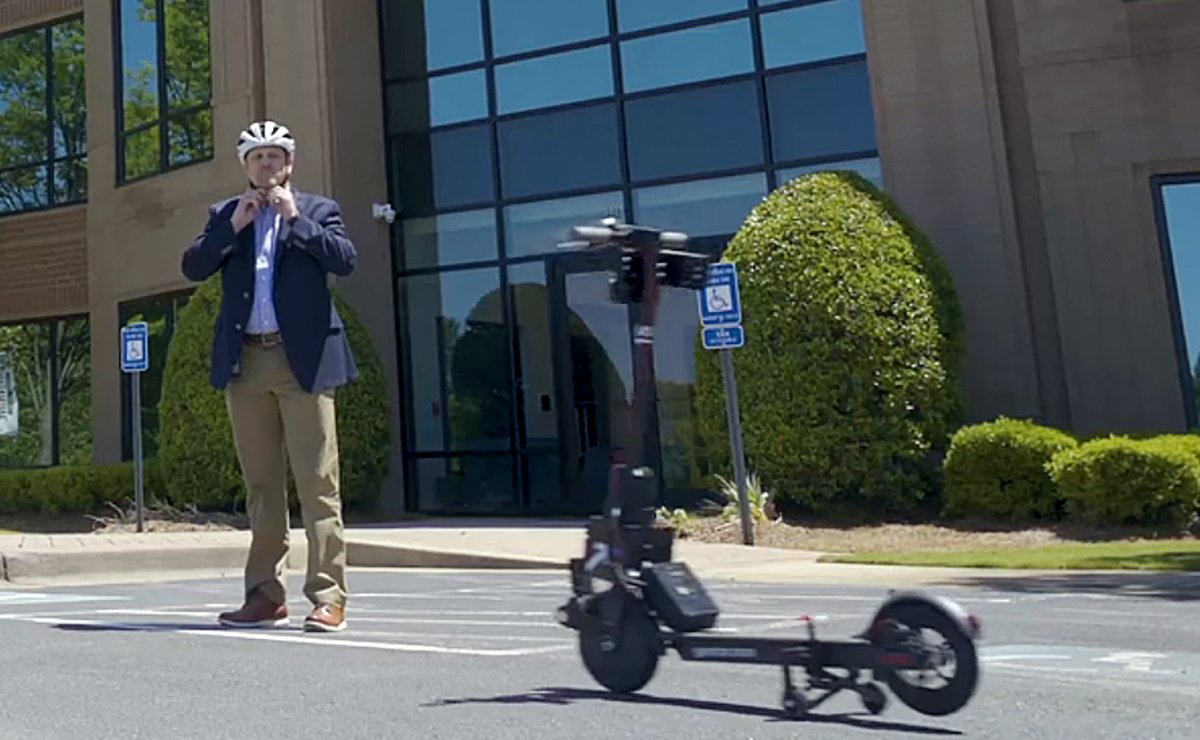| Riderless scooters hit the streets of Atlanta suburb |

In Peachtree Corners, Ga., residents may see an e-scooter zooming down a street – with no rider in sight.
Electric scooter company Go X and Tortoise, a startup specializing in “remote repositioning” technology, have rolled out teleoperated scooters in the northeast Atlanta suburb. They are making them available to the public in a six-month pilot project at the Curiosity Lab, an autonomous-vehicle test track and innovation center in a 500-acre technology park.
The “living lab” announced the partnership on May 20, calling this the first time teleoperated scooters have been deployed on public roads.
A Tortoise team in Mexico City remotely controls the scooters while watching a live feed from cameras mounted on the vehicles.
To take a ride, the customer uses an app to summon a Go X Apollo scooter. A remote operator sends the vehicle to the customer’s location. The rider assumes manual control. Once the journey ends, a remote operator sends the scooter back to a central base for parking, charging and cleaning.
“Every time the scooters take a ride, the [remote] driver is learning and the scooter’s collecting data, so that in the future the whole experience will be better,” Betsy Plattenburg, executive director of Curiosity Lab, told Automotive News.
She said that the e-scooters have been met with “a lot of excitement” from riders. “It helps people really imagine the future,” she said.
The coronavirus pandemic has caused some problems, Plattenburg said. Many potential riders are choosing to stay inside rather than hop on a scooter.
“I don’t think they’re getting as much use as they might have had we launched in January or February,” she said.
Go X has implemented safety measures in response to the pandemic. These include daily coronavirus checks for employees and disinfection of the vehicles after every use. After someone gets off an e-scooter, a member of the team in Mexico City directs it back to a sanitation station, where a trained worker will clean it. E-scooters that have been disinfected are marked with a sticker.
Despite the hurdles that the coronavirus pandemic has created, enthusiasm for the e-scooters hasn’t died down, Plattenburg said, adding the sanitation process was “not something that any of us really would’ve considered in January” when the scooters were first tested. In June, she said, it’s a necessity.
She said more mobility solutions are in store for the Curiosity Lab.
“We’re excited about Tortoise and Go X, we’re excited about some of the other things we have in our pipeline,” she said. “It’ll be a really interesting, crazy year.”
— Krystal Hur
What you need to know
Cruise names first dedicated safety chief General Motors’ self-driving subsidiary, Cruise, has hired Louise Zhang, a top engineer at Lucid Motors who helped build Tesla’s safety team, as its first dedicated safety chief. Zhang oversaw vehicle safety and regulatory compliance for Lucid Motors since 2015, after spending nearly six years at Tesla. She was responsible for overall safety of the Model S sedan and Model X crossover, which received five-star ratings in government crash testing.
Ford sheds light on EV plans Ford Motor Co. will offer battery-electric versions of its F-150 pickup and Transit van by mid-2022, COO Jim Farley said Wednesday. It’s the most detailed timeline yet for the company’s electric-vehicle plans and comes as Ford faces increasing EV competition. The automaker previously said only that the Transit EV would be a 2022 model and that the F-150 EV would be available in “the next couple years.” Both products are key to Ford’s strategy of increasing its focus on high-margin, commercial vehicles. They face challengers on all sides, including electric startups such as Rivian and Bollinger Motors, as well as traditional rivals such as General Motors, which is planning its own electric van, according to Reuters.
Roundup
GM CEO Mary Barra sees the U.S. transition to electric vehicles taking decades.
AV developers dispute IIHS study findings.
VW will start ID3 deliveries in September with software patch.
NHTSA modernizes early-warning online reporting tool for manufacturers.
Rivian hires new COO, adds Tesla vets to roster.
Ford’s 2020 Escape plug-in to have 37-mile electric range.
FCA recalls Pacifica hybrid minivans over fire risk.
Elon Musk says solving Tesla Model Y production issues is top priority. Meanwhile, Tesla looks to rev up production of semi.
The United Kingdom is considering a scrapping program to boost EV sales, a British newspaper said.
Brain food
FCA is an Israeli startup’s latest automotive partner for data.
Last mile
Battery-electric and hydrogen fuel cell truckmaker Nikola hits $34 billion in market value — and no revenue.